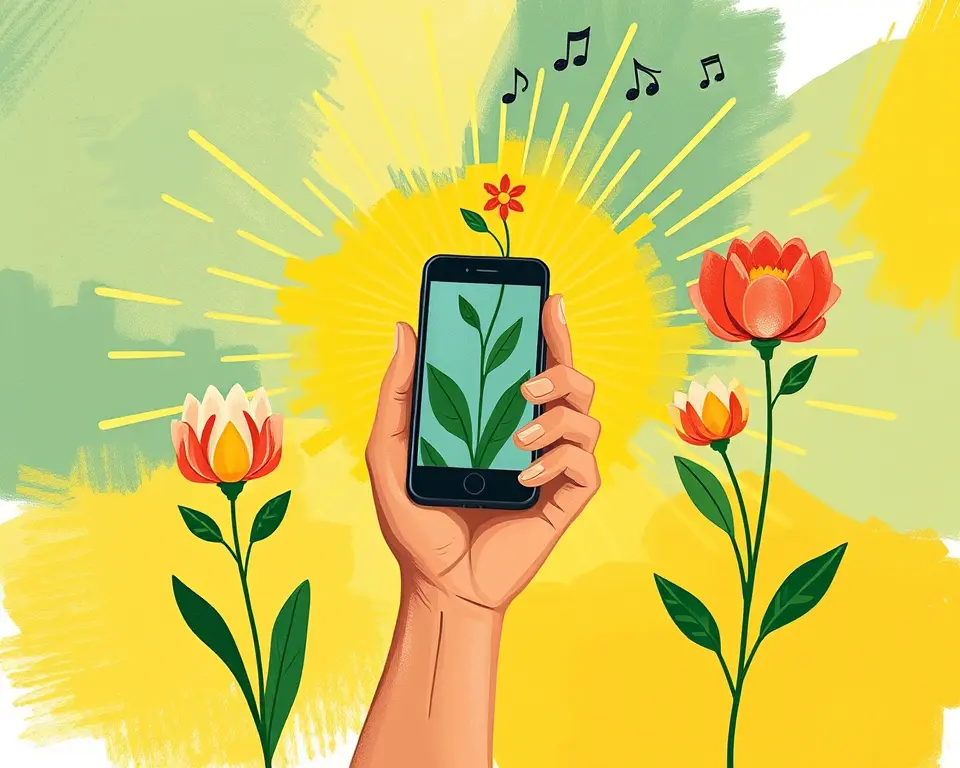In today’s always-on world, our smartphones are indispensable tools. But beyond communication and entertainment, they can be powerful allies in building mental strength. It’s not technology that’s detrimental, but how we choose to use it. By making conscious choices, you can transform your smartphone into a pocket-sized mental wellness hub.
1. Harness the Power of Guided Support Apps
Feeling overwhelmed, stressed, or anxious? There’s likely an app for that. Mental health apps offer guided meditations, mindfulness exercises, and stress reduction techniques tailored to your specific needs.
- Calm: Known for its dreamy interface and extensive library, Calm provides guided meditations, sleep stories, and relaxation techniques. It’s a popular choice for improving sleep quality and managing stress.
- Headspace: With its user-friendly design and wealth of resources, Headspace offers guided meditations, focus activities, and movement classes. Research suggests that using mindfulness apps like Headspace for just two weeks can significantly reduce stress levels.
- Insight Timer: This app offers a vast library of free meditations, music tracks, and talks. It’s a great option for those seeking variety and a sense of community.
- Smiling Mind: As a free mindfulness meditation app, Smiling Mind provides resources designed to help people manage daily pressures and stress. It is adaptable to individuals, families, and groups across different age ranges.
2. Cultivate Mindfulness with Dedicated Apps
Mindfulness is the practice of paying attention to the present moment without judgment. Regular mindfulness practice can reduce stress, improve focus, and enhance emotional regulation.
- The Mindfulness App: Offers guided meditations and courses from experts worldwide, with options for various moods and experience levels. Includes personalized reminders and statistics to support your practice.
- Breathe, Think, Do with Sesame: Designed for kids, this app helps children learn to calm their thoughts and improve focus through interactive sessions.
- Balance: Great option for daily meditation.
3. Turn to Technology for Mood Tracking and Self-Reflection
Journaling is a powerful tool for self-reflection and emotional processing. Your smartphone can serve as a convenient digital journal, allowing you to track your thoughts, emotions, and experiences.
- Moodfit: Track your moods, set goals, and receive customized insights based on your data. This app encourages you to consider various aspects of your well-being, from sleep to exercise.
- Happify: Uses evidence-based interventions from positive psychology and Cognitive Behavioral Therapy (CBT) to boost happiness and reduce stress. Its engaging activities and games offer a fun, interactive way to build emotional strength.
4. Reframe Social Media into a Source of Strength
Social media often gets a bad rap for its potential negative impact on mental health. However, with intentional curation, you can transform your social media feeds into sources of inspiration and support.
- Follow positive and inspiring accounts: Choose to follow people who motivate you to become better and offer valuable information.
- Unfollow accounts that trigger negative emotions: Don’t hesitate to unfollow, mute, or block accounts that make you feel worse about yourself.
- Engage in meaningful interactions: Instead of passively scrolling, engage in conversations, share your thoughts, and build connections with others.
5. Disable mobile internet access to regain focus
Disabling mobile internet access can lead to improved well-being, sharper attention, and more meaningful daily routines. It’s about using technology more consciously. Even a temporary switch-off can bring noticeable changes in concentration levels and mental peace.
- Reduce cognitive overload: Constant access to the web fragments attention, leading to cognitive overload. Turning off mobile data acts like a detox for the mind, allowing it to recharge and function better.
- Improve sustained attention: People who removed mobile internet access had better sustained attention compared to those who stayed constantly connected.
6. Gamify Your Way to Mental Wellness
Games aren’t just for fun; they can also be a valuable tool for improving mental health. Engaging in enjoyable games can provide a break from stress and boost serotonin levels.
- Choose games that promote relaxation and mindfulness: Look for games that encourage focus, problem-solving, and creative expression.
- Set time limits: To prevent excessive screen time, set time limits for gaming and stick to them.
- Use games as a reward: Reward yourself with a few minutes of gaming after completing a challenging task.
7. Seek Support and Professional Help When Needed
While smartphones can be valuable tools for self-improvement, they are not a substitute for professional help. If you’re struggling with a mental health condition, it’s essential to seek support from a qualified therapist or counselor.
- BetterHelp: Best for talk therapy.
- Talkspace: Best for depression.
- WYSA: AI chatbots seem to be the way of the future, and the one offered by WYSA coaches you through your mental health concerns using cognitive behavioral therapy (CBT), dialectical behavior therapy (DBT), and other techniques.
- Medisafe: The Medisafe app makes tracking your use, mood and symptoms super accessible. The app sends personalized reminders for when to take medications, and also allows you to track your medication history, mood, symptoms, and side effects to help your healthcare provider understand how treatment is working.
- What’s Up? and MoodTools: Offer support for those dealing with both anxiety and depression.
- MindShift CBT: Recommended for its use of cognitive-behavioural therapy techniques to help users manage anxiety and stress.
Your smartphone can be a powerful tool for building mental strength. By using apps for guided support, cultivating mindfulness, tracking your mood, curating your social media feeds, and seeking professional help when needed, you can unlock your inner fortress and thrive in today’s challenging world.










